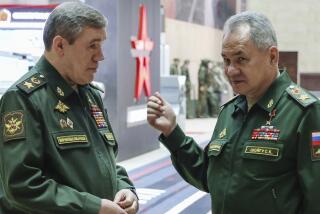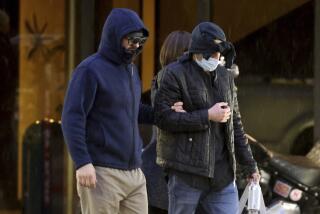Broad Kremlin Corruption Alleged : Russia: Suspended prosecutor says 780 officials are suspected of insider trading.
- Share via
MOSCOW — Suspended Prosecutor General Yuri I. Skuratov, alleging widespread corruption within the Russian government, said Saturday that 780 high-ranking current and former officials are under investigation for improperly trading in lucrative government treasury bills.
Among those suspected of abusing their positions by speculating in high-yield securities before the market collapsed last year are two former deputy prime ministers, former Cabinet ministers, and officials of both the Russian Central Bank and the Finance Ministry, Skuratov said.
His assertions came as law enforcement agencies worldwide are looking into a raft of charges of corruption emanating from Moscow, including allegations that a New York bank laundered money for the Russian mafia and that President Boris N. Yeltsin’s daughters accepted as much as $1 million from a Kremlin-hired contractor.
Skuratov said he suspects that some top Russian officials used inside information to cash out of the securities market just before Russia’s August 1998 fiscal collapse and then transferred their money to foreign banks, including some in the United States.
“Here we see a clear overlapping of the corruption in Russia and American banks,” Skuratov said in an interview with The Times. “This is why I say [that] without the help of Russia’s law enforcement bodies, it is impossible to carry out a complete investigation of these activities.”
For the time being, Skuratov is unable to pursue such cases. Yeltsin suspended him in April after state television broadcast a videotape of a man resembling the prosecutor general in bed with two prostitutes. Skuratov has declined to discuss the video but has fought to hang on to his job, charging that Yeltsin’s inner circle is trying to oust him because he was zeroing in on corruption in the Kremlin.
Of the 780 officials Skuratov said had invested in treasury bills while holding government posts, he named only three: former Deputy Prime Minister Anatoly B. Chubais, one of Yeltsin’s closest advisors; former Deputy Prime Minister Valery M. Serov, who was dismissed in February 1998; and former Foreign Minister Andrei V. Kozyrev, now a member of parliament.
Chubais and Serov could not be reached for comment Saturday, but Kozyrev, traveling in Poland, denied that he had ever traded in government securities.
“This is a brazen, 100% lie,” Kozyrev said. “If anyone manages to find at least a single security [owned by me], I am ready to pay this person half the dividends. Otherwise I intend to sue the slanderers.”
The allegations of misconduct revolve around the government sale of short-term treasury bills known as GKOs. Widely considered now to have been little more than a pyramid scheme, the GKOs paid high interest rates with revenue from the sale of new GKOs.
By mid-1998, the government had reached such a state of financial crisis that it was offering GKOs at interest rates as high as 200%. In August 1998, when the government devalued the Russian currency, the ruble, and defaulted on foreign loans, the GKO market collapsed, and banks and other investors were stuck with hundreds of millions of dollars in virtually worthless securities.
Skuratov said his office was investigating whether any officials used knowledge of the imminent ruble devaluation and loan default to cash in their GKOs in the days before the collapse.
“We investigated the Central Bank, and we seized a database of transactions carried out by individuals in the GKO market,” he said. “To our surprise, we found that there were about 800 top-ranking officials from the federal level and the regional level.”
Skuratov said that Russian law does not prohibit insider trading but that the officials could be charged with abuse of office if they improperly used their inside knowledge.
The prosecutor’s office also was looking into how government officials who were paid less than $10,000 a year could amass GKO investments worth $200,000 or more. In addition, investigators found that few of the officials paid taxes on their GKO profits.
Skuratov said that he did not recall how much money Chubais had traded in GKOs but that “it was quite an interesting sum of money.”
Chubais is one of the key figures of the Yeltsin presidency. The architect of privatization, he helped create the system in which a handful of wealthy oligarchs control much of the country’s wealth and have vast political influence.
Chubais managed Yeltsin’s successful 1996 reelection, served as his chief of staff and then became deputy prime minister overseeing all economic matters. A personal friend of U.S. Treasury Secretary Lawrence Summers, he was instrumental in winning a $4.8-billion loan from the International Monetary Fund in July 1998.
Russia quickly spent most of the IMF money to prop up the ruble--using the dollars to buy rubles and keep the price artificially high. Among the biggest beneficiaries of the IMF loan were GKO holders who cashed in their securities and exchanged the rubles for dollars just before the August crash.
Since spring 1998, Chubais has headed Russia’s electricity monopoly, Unified Energy Systems, and now he is considered an oligarch himself.
Skuratov said investigators have not questioned Chubais in the case and are still investigating whether he improperly used his position in the government when trading in GKOs.
“Chubais was a deputy prime minister, and he was overseeing the activity of the Finance Ministry,” Skuratov said. “He’s a brilliant financier himself, and all the issues related to finances in Russia were part of his responsibility, so we can assume he was adequately informed.
“The two things I’m sure about is he did play on the GKO market and he was deputy prime minister,” he added.
Since his suspension, Skuratov said, the investigation into GKO dealings has slowed to a crawl because investigators are wary of challenging such a powerful array of officials.
“There are only two or three people conducting this investigation, and if they go at the current rate, it will take them 50 years to find out what happened,” he said.
Skuratov attributes his suspension to having made too many powerful enemies at the same time--from Chubais to tycoon Boris A. Berezovsky to Yeltsin’s daughter Tatyana Dyachenko.
Skuratov said the Kremlin first asked him to step down in February as his office prepared to arrest Berezovsky, who is suspected of helping to divert profits from the state-owned airline, Aeroflot, to several Swiss-based firms.
In addition, the Kremlin had just learned that Skuratov was investigating whether the Swiss design firm Mabetex gave kickbacks to the Yeltsin family in exchange for $300 million in Kremlin renovation contracts. Mabetex is accused of providing credit cards and a $1-million credit line to Dyachenko and her sister, Yelena Okulov.
The Mabetex case took a new twist Saturday when an Italian newspaper published documents showing that Kremlin property manager Pavel P. Borodin had opened a Swiss bank account and given control of it to a Mabetex official.
The newspaper, Corriere della Sera, published a copy of what it said was the form Borodin signed to open the account in the Gottardo Bank of Lugano in 1995.
Borodin has denied ever opening a foreign bank account. In an interview with The Times on Tuesday, he suggested that someone might have opened accounts under his name without his knowledge.
Despite the allegations swirling around the Kremlin, Skuratov said he believes that Yeltsin is shielded by his staff and is unlikely to know much about the allegedly corrupt activities of his inner circle.
“I’m sure he is in principle an honest man,” Skuratov said. “His participation, his complicity, is either a sad coincidence or a misfortune not of his own making. It’s just that the people around him whose job it is to take care of the president’s finances made these mistakes, maybe inadvertently, maybe deliberately.”
*
Alexei V. Kuznetsov of The Times’ Moscow Bureau and Maria De Cristofaro of the Rome Bureau contributed to this report.
More to Read
Sign up for Essential California
The most important California stories and recommendations in your inbox every morning.
You may occasionally receive promotional content from the Los Angeles Times.










